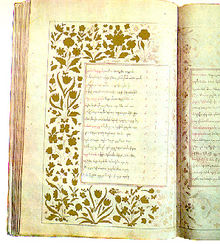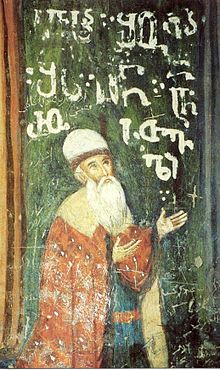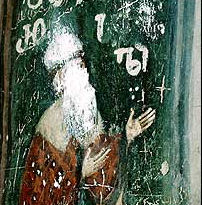Illhøllia Tunnel and Shota Rustaveli: Difference between pages
Adding geodata: {{coord missing|Norway}} |
Wiki Roxor (talk | contribs) |
||
| Line 1: | Line 1: | ||
[[Image:Shota.jpg|right|thumb|<small>''Shota Rustaveli'', an artistic notion of the poet by [[Sergo Kobuladze]] (1937).</small>]] |
|||
'''Illhøllia Tunnel''' ({{lang-no|Illhøllia tunnel}}) is a 1260 meter long tunnel on [[European route E6]] in [[Dunderlandsdal]] in [[Rana]] municipality, [[Nordland]], [[Norway]]. The tunnel was opened in [[2002]]. The tunnel is located in an area with very steep mountains. Before the opening of the tunnel, [[European route E6]] had to be continuously repaired because the road was about to collapse into [[Ranelva]] due to erosion from brooks beneath the road. |
|||
'''Shota Rustaveli''' ({{lang-ka|შოთა რუსთაველი}}, 1160 - ?) was a [[Georgia (country)|Georgian]] poet of the [[12th century]], and the greatest classic of Georgian secular literature. He is author of "[[The Knight in the Panther's Skin]]" ("Vepkhist'q'aosani" in Georgian), the Georgian national [[epic poetry|epic poem]]. |
|||
== Biography == |
|||
<gallery> |
|||
[[Image:Shota rustveli2.jpg|thumb|left|<small>''Shota Rustaveli'', a painting by the French artist Fliert based on an old Georgian manuscript. 1852</small>]] |
|||
Image:Illhøllia tunnel seen from South.JPG|Southern entrance |
|||
Little, if anything, is known about Rustaveli from the contemporaneous sources. His poem itself, namely the prologue, provides a clue to his identity; the poet identifies himself as "a certain Rustveli." "Rustveli" is not a surname, but a territorial epithet which can be interpreted as "of/from/holder of Rustavi." The later Georgian authors of the 15th-18th centuries are more informative: they are almost unanimous in identifying him as Shota Rustaveli, a name which is preserved on a fresco and a document from the formerly Georgian [[Monastery of the Cross|Monastery of the Holy Cross]] at [[Jerusalem]]. The fresco was described by the Georgian pilgrim Timote Gabashvili in 1757/58, and rediscovered by a team of Georgian scholars in 1960. The same Jerusalem document speaks of Shota as a sponsor of the monastery and a "high treasurer," thus echoing a popular legend that Rustaveli was a minister at [[Queen Tamar]]’s court and retired to the monastery in an advanced age. Both a folk tradition and the 17th-century royal poet [[Archil of Imereti|Archil]] identify Rustaveli as a native to the southern Georgian region of [[Meskheti]], where his home village Rustavi was located (not to be confused with the modern-day city of [[Rustavi]] near [[Tbilisi]]). He is assumed to have been born between 1160 and 1165. A legend has it that Rustaveli was educated at the medieval Georgian academies of [[Gelati]] and [[Ikalto]], and then in "[[Greece]]" (i.e., the [[Byzantine Empire]]). He must have produced his major work no earlier than the 1180s and no later than the first decade of the 13th century, most probably c. 1205-1207. [[Image:Shota niello.jpg|thumb|19th century portrait of Shota Rustaveli]] |
|||
Image:Illhøllia seen from South.JPG|Illhøllia seen from the southern entrance, with Ranelva beneath the valleys |
|||
Image:Illhøllia tunnel seen from North A.JPG|Northern entrance |
|||
Image:Illhøllia tunnel seen from North B.JPG|Northern entrance |
|||
</gallery> |
|||
== His work == |
|||
{{coord missing|Norway}} |
|||
"The Knight in the Panther's Skin" (ვეფხისტყაოსანი) has been translated into many languages. It was first printed in [[1712]], in [[Tbilisi]] (capital of [[Georgia (country)|Georgia]]). |
|||
Among the illustrated secular works produced in Georgia, the manuscripts of "The Knight in the Panther's Skin" occupy an important place. |
|||
[[Category:Road tunnels in Nordland]] |
|||
[[Image:RustaveliManuscript.jpg|left|thumb|<small>Manuscript</small>]] |
|||
{{norway-tunnel-stub}} |
|||
In the [[Institute of Manuscripts of Georgia]] (Tbilisi) are two folios of the text of the XVI century, and some lines of the poem belong to the XIV century. All other copies of the poem belong to the XVII century (manuscript of c. 1653, H-54 of the Institute of Manuscripts). |
|||
[[no:Illhøllia tunnel]] |
|||
[[Image:Shota Rustaveli.jpg|thumb|right|<small>Shota Rustveli (a fresco in the [[Jerusalem]] [[Monastery of the Cross]]).</small>]] |
|||
The highest Prize of the [[Republic of Georgia]] in the fields of Art and Literature is the [[Shota Rustaveli State Prize]]. The main street in Tbilisi is the Rustaveli Avenue. Also existing in Tbilisi are the [[Rustaveli Theatre]], the [[Shota Rustaveli Institute of Georgian Literature]] of the [[Georgian Academy of Sciences]], the [[Shota Rustaveli Underground Station]], etc. |
|||
==Vandalism of Rustaveli fresco in Israel== |
|||
[[Image:Rustaveli damage 2004.jpg|thumb|250px|Fresco of Rustaveli after being vandalized in 2004]] |
|||
The fresco representing the legendary Georgian poet [[Shota Rustaveli]] was vandalized on June, 2004 in the 11th-century Georgian-built [[Monastery of the Cross|Monastery of the Holy Cross]]. An unknown criminal scratched out the face of Shota Rustaveli and part of the accompanying Georgian inscription with his name on the south-west pier. Georgia officially complained to Israel after the priceless fresco was defaced in Jerusalem. <ref>[http://news.bbc.co.uk/2/hi/europe/3867845.stm Precious Jerusalem fresco defaced]</ref> |
|||
==Other== |
|||
On [[September 3]], [[2001]], [[Israel]] and Georgia jointly issued [[postage stamp]]s to honor Shota Rustaveli. Designed by Yitzhak Granot, the Israeli stamp (3.40 NIS) showed the author with Hebrew text in the background. |
|||
===Mihály Zichy=== |
|||
[[Mihály Zichy]], a 19th century [[Kingdom of Hungary|Hungarian]] painter, rose to the rank of "national painter" in Georgia as he produced the classic illustrations that have been frequently used in editions of Rustaveli's poetry. A sculpture and a street commemorate Zichy's work in [[Tbilisi]]. |
|||
== External links == |
|||
* [http://www.sacred-texts.com/asia/mps/index.htm The Man in the Panther's Skin: full text of M. Wardrop's English translation.] |
|||
* [http://sangha.net/countries/Georgia/shota.htm Shota Rustaveli. "The Knight in the Panther's Skin" (Fragments in English).] |
|||
* [http://www.rzuser.uni-heidelberg.de/~ci4/georgien/maler/kobuladse/rustaveli.htm Illustrations by Sergo Kobuladze.] |
|||
* [http://www.fmueller.net/rustaveli_de.html "Shota Rustaveli. "Der Ritter im Tigerfell" (In German).] |
|||
* [http://www.acnet.ge/literat.htm Shota Rustaveli Institute of Georgian Literature of the Georgian Academy of Sciences.] |
|||
== Literature == |
|||
*[[Tite Margwelaschwili]]. "Der Mann in Pantherfell".- "Georgica", London, 1936 (in German) |
|||
*[[Zviad Gamsakhurdia]]. "Tropology of "The Knight in the Panther's skin"" (a monograph), Tbilisi, 1991, 352 pp (in Georgian, English summary) |
|||
== References == |
|||
<references/> |
|||
{{commonscat}} |
|||
[[Category:12th century writers|Rustaveli, Shota]] |
|||
[[Category:Medieval poets|Rustaveli, Shota]] |
|||
[[Category:Georgian poets|Rustaveli, Shota]] |
|||
[[ar:شوتا رستافلي]] |
|||
[[be-x-old:Шата Руставэлі]] |
|||
[[br:Chota Rustaveli]] |
|||
[[ca:Shota Rustaveli]] |
|||
[[cy:Shota Rustaveli]] |
|||
[[de:Schota Rustaweli]] |
|||
[[es:Shota Rustaveli]] |
|||
[[eo:Ŝota Rustaveli]] |
|||
[[fa:شوتا روستاولی]] |
|||
[[fr:Chota Roustaveli]] |
|||
[[hi:शोथा रुस्थावेली]] |
|||
[[id:Shota Rustaveli]] |
|||
[[is:Shota Rustaveli]] |
|||
[[it:Shota Rustaveli]] |
|||
[[he:שותא רוסתוולי]] |
|||
[[ka:შოთა რუსთაველი]] |
|||
[[sw:Shota Rustaveli]] |
|||
[[la:Siota Rustaveli]] |
|||
[[lb:Šot'a Rust'aveli]] |
|||
[[hu:Sota Rusztaveli]] |
|||
[[mn:Шота Руставели]] |
|||
[[ja:ショタ・ルスタヴェリ]] |
|||
[[nl:Sjota Roestaveli]] |
|||
[[pl:Szota Rustaweli]] |
|||
[[pt:Shota Rustaveli]] |
|||
[[ru:Шота Руставели]] |
|||
[[simple:Shota Rustaveli]] |
|||
[[fi:Šota Rustaveli]] |
|||
[[sv:Sjota Rustaveli]] |
|||
[[tt:Шота Руставели]] |
|||
[[tr:Şota Rustaveli]] |
|||
[[uk:Руставелі Шота]] |
|||
[[vo:Jota Rustaveli]] |
|||
[[bat-smg:Shota Rustaveli]] |
|||
[[zh:紹塔·魯斯塔韋利]] |
|||
Revision as of 17:14, 10 October 2008
Shota Rustaveli (Georgian: შოთა რუსთაველი, 1160 - ?) was a Georgian poet of the 12th century, and the greatest classic of Georgian secular literature. He is author of "The Knight in the Panther's Skin" ("Vepkhist'q'aosani" in Georgian), the Georgian national epic poem.
Biography

Little, if anything, is known about Rustaveli from the contemporaneous sources. His poem itself, namely the prologue, provides a clue to his identity; the poet identifies himself as "a certain Rustveli." "Rustveli" is not a surname, but a territorial epithet which can be interpreted as "of/from/holder of Rustavi." The later Georgian authors of the 15th-18th centuries are more informative: they are almost unanimous in identifying him as Shota Rustaveli, a name which is preserved on a fresco and a document from the formerly Georgian Monastery of the Holy Cross at Jerusalem. The fresco was described by the Georgian pilgrim Timote Gabashvili in 1757/58, and rediscovered by a team of Georgian scholars in 1960. The same Jerusalem document speaks of Shota as a sponsor of the monastery and a "high treasurer," thus echoing a popular legend that Rustaveli was a minister at Queen Tamar’s court and retired to the monastery in an advanced age. Both a folk tradition and the 17th-century royal poet Archil identify Rustaveli as a native to the southern Georgian region of Meskheti, where his home village Rustavi was located (not to be confused with the modern-day city of Rustavi near Tbilisi). He is assumed to have been born between 1160 and 1165. A legend has it that Rustaveli was educated at the medieval Georgian academies of Gelati and Ikalto, and then in "Greece" (i.e., the Byzantine Empire). He must have produced his major work no earlier than the 1180s and no later than the first decade of the 13th century, most probably c. 1205-1207.

His work
"The Knight in the Panther's Skin" (ვეფხისტყაოსანი) has been translated into many languages. It was first printed in 1712, in Tbilisi (capital of Georgia).
Among the illustrated secular works produced in Georgia, the manuscripts of "The Knight in the Panther's Skin" occupy an important place.

In the Institute of Manuscripts of Georgia (Tbilisi) are two folios of the text of the XVI century, and some lines of the poem belong to the XIV century. All other copies of the poem belong to the XVII century (manuscript of c. 1653, H-54 of the Institute of Manuscripts).

The highest Prize of the Republic of Georgia in the fields of Art and Literature is the Shota Rustaveli State Prize. The main street in Tbilisi is the Rustaveli Avenue. Also existing in Tbilisi are the Rustaveli Theatre, the Shota Rustaveli Institute of Georgian Literature of the Georgian Academy of Sciences, the Shota Rustaveli Underground Station, etc.
Vandalism of Rustaveli fresco in Israel

The fresco representing the legendary Georgian poet Shota Rustaveli was vandalized on June, 2004 in the 11th-century Georgian-built Monastery of the Holy Cross. An unknown criminal scratched out the face of Shota Rustaveli and part of the accompanying Georgian inscription with his name on the south-west pier. Georgia officially complained to Israel after the priceless fresco was defaced in Jerusalem. [1]
Other
On September 3, 2001, Israel and Georgia jointly issued postage stamps to honor Shota Rustaveli. Designed by Yitzhak Granot, the Israeli stamp (3.40 NIS) showed the author with Hebrew text in the background.
Mihály Zichy
Mihály Zichy, a 19th century Hungarian painter, rose to the rank of "national painter" in Georgia as he produced the classic illustrations that have been frequently used in editions of Rustaveli's poetry. A sculpture and a street commemorate Zichy's work in Tbilisi.
External links
- The Man in the Panther's Skin: full text of M. Wardrop's English translation.
- Shota Rustaveli. "The Knight in the Panther's Skin" (Fragments in English).
- Illustrations by Sergo Kobuladze.
- "Shota Rustaveli. "Der Ritter im Tigerfell" (In German).
- Shota Rustaveli Institute of Georgian Literature of the Georgian Academy of Sciences.
Literature
- Tite Margwelaschwili. "Der Mann in Pantherfell".- "Georgica", London, 1936 (in German)
- Zviad Gamsakhurdia. "Tropology of "The Knight in the Panther's skin"" (a monograph), Tbilisi, 1991, 352 pp (in Georgian, English summary)
